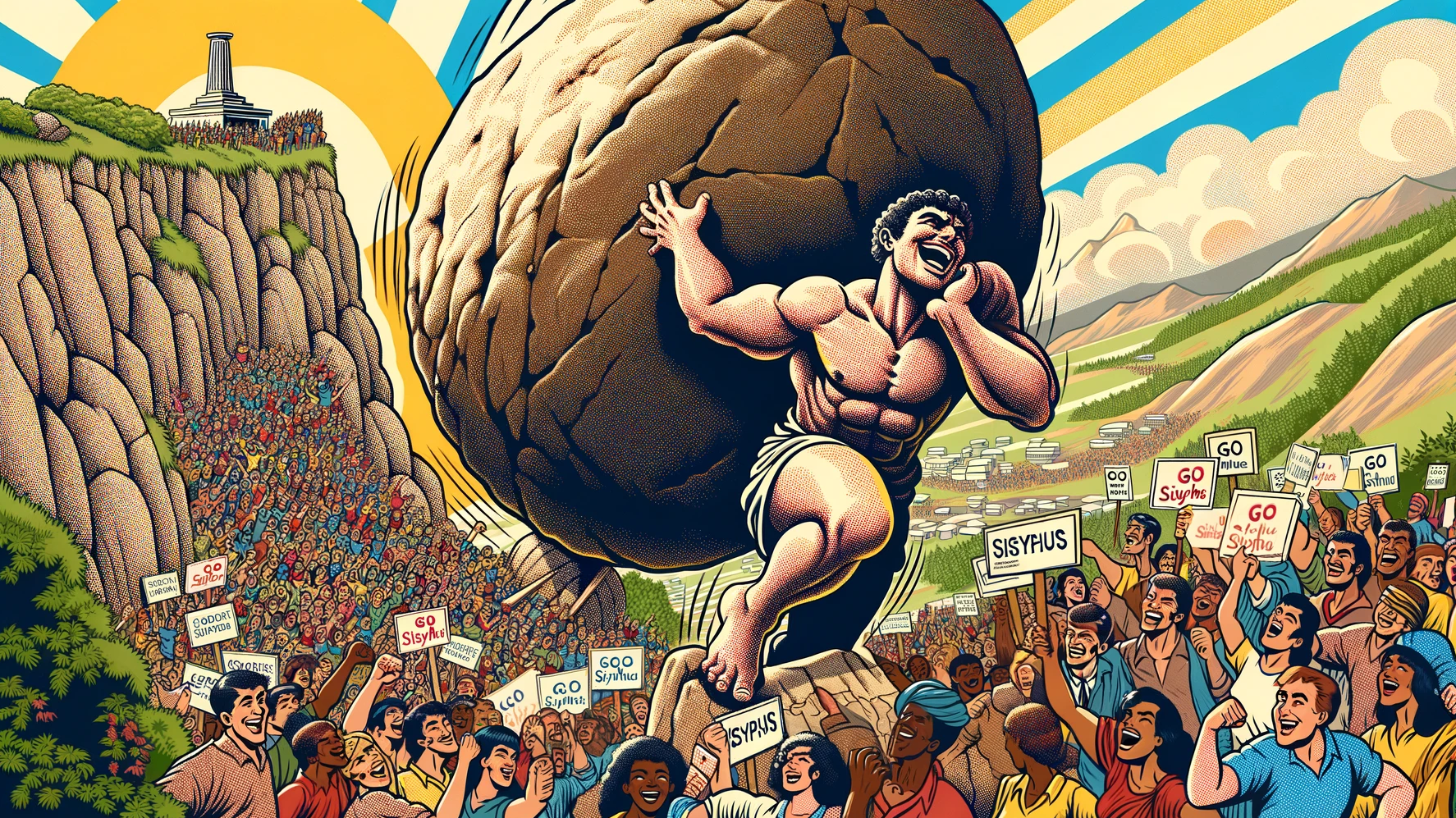Don’t Let the Robots Get You Down

An AI imagines Sisyphus happy. Notice that this image is definitely missing the last 20 percent…
The holidays are here, but software isn’t seasonal. We gotta rejig the drip campaign, continue building the Android app, keep working on marketing, meet with prospective partners, etc. People are taking time off, obviously. We’re not that kind of startup. But the product has to keep operating (even on Christmas).
And after building software for collective decades, I think everyone would say: It’s still really freaking hard. Deadlines slip. Requirements change. Brilliant ideas turn out to be dumb. You change your mind and throw work, money, and time away.
We’ve spent the whole year in the tech industry hearing how programmers will soon be obsolete, how every job is about to be replaced by AI, how software-as-a-service products like ours will soon be irrelevant, and how animators and writers and musicians shouldn’t even learn to code but should instead look into professional dog walking.
For reasons of personal and professional interest, I’ve spent a portion of the last year getting into AI. There’s a lot there! It’s novel in so many ways. It can make lists and summarize things! Then they show us “Anna Indiana,” an AI-generated pop singer with a melty face, producing an absolute endurance test of auditory sludge. And I go, “Wait, really? Is this the goal?”
“Just you wait,” they say, which they also said about Bitcoin. Sometimes it feels like no one in Silicon Valley has ever been to a museum or to a concert, except maybe on a school trip. Of course, it wasn’t Anna Indiana or any other Silicon Valley attempt at culture that brought anyone pleasure in 2023—it was real artists like Taylor Swift and Beyoncé, who took over the world with these perfectly crafted mega-spectacles that pulled millions of people into stadiums and movie theaters.
Okay, so maybe Anna Indiana represents the first steps towards some sort of AI pop star. Maybe she could write a better song. Maybe she could be 50% good instead of 100% horrifying. But what I wish I could get across to our friends in the Palo Alto area is that the last 20% is really, actually, hard—not just in tech, but in writing, music-making, carpentry, middle-school teaching, cobbling—it’s a grind. Sometimes for dumb, bureaucratic reasons, sometimes because it’s just hard to make things happen, inside or outside of the computer. And everything happens—all the growth, profit, promotions—in that last 20%. That’s when human connection happens.
If your work involves nothing but cutting-and-pasting, the robots are going to do most of that. Which is tough to contemplate because that’s how a lot of people get their first job. I don’t know what will replace that. There are lots of ideas—from Luddites smashing the server racks en masse to Universal Basic Income—but it’s a real problem.
But many jobs aren’t all cutting-and-pasting, so I figured I’d offer this up at the end of the year: If you do work that is hard, kind of a grind sometimes, and involves lots of little and small decisions, I think you’re pretty safe for a while. As a computer person who has spent a lot of this year messing with AI, and someone who has kept an eye on AI promises for decades, the things they’re saying about the future seem really far away. There’s tons of progress ahead, but it’s not a mistake to get a mortgage or plan a vacation.
Just as most jobs are harder than people think, most things in life are nowhere near as generic as people think. I feel it a lot at work. Why would we build “another” data management system when Excel and Airtable exist? Why would someone write “another” novel when so many have been written? Why does Martin Scorcese keep making movies after Goodfellas? Did we need Hugo? It’s a good question! Yet audiences keep going to the theater, even though Blu-Rays were supposed to kill movie theaters starting in 2005.
We keep making stuff because we want to contextualize and internalize what’s happened. If AI changes everything, then we’ll end up making more stuff as humans in order to figure out what AI means. Rich likes to say “software is an op-ed” and I think that’s right—we make stuff because we have opinions and we want to share them. So: News of your obsolescence is greatly exaggerated. Keep doing that last 20%. We need it!